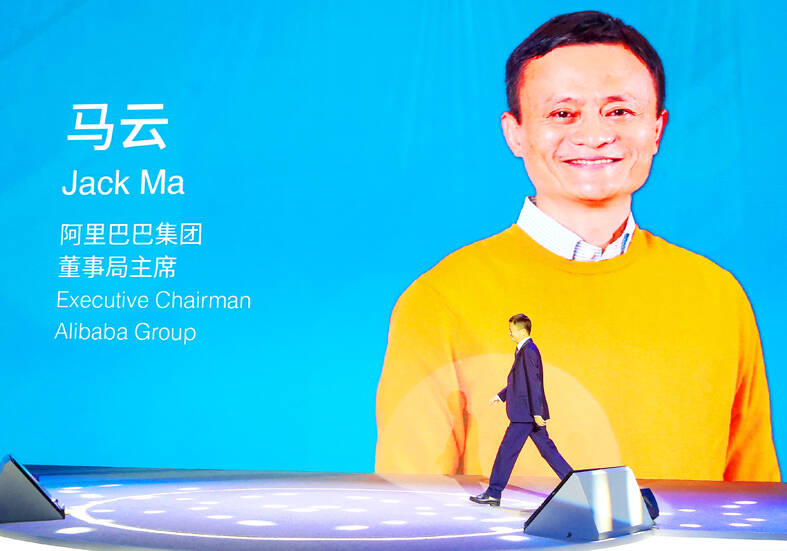Alibaba Group Holding Ltd (阿里巴巴) cofounder Jack Ma (馬雲) is in Hong Kong for a series of meetings with tech and finance executives, sustaining a recent flurry of activity that has taken him round the world in the span of months.
The billionaire, who has kept a low profile since Beijing in 2020 singled out first Ant Group Co (螞蟻集團) and then Alibaba for regulatory overhauls, has been meeting prominent figures based in the territory, the Hong Kong Economic Times reported, citing anonymous sources.
Ma arrived in past few days, but his exact agenda remains unclear, a person familiar with the situation said, asking to remain anonymous.

Photo: AFP
Since late last year, Ma has gradually resumed the globe-trotting that once defined China’s best-known entrepreneur.
He spent time in Tokyo and the Japanese countryside before making his way to Thailand, where he toured food spots and reportedly attended a Muay Thai boxing match.
Before that, he visited the US and Israel, the Financial Times reported in November last year.
The executive — among China’s most recognizable faces — has been on the move since signs emerged that Beijing was relenting in a campaign to curtail the influence and power of Internet giants.
This month, Ma ceded controlling rights to his Ant fintech empire, which many observers took as a signal that the punishing crackdown was nearing an end.
Alibaba’s shares climbed as much as 3.4 percent in Hong Kong yesterday, outperforming the broader market.
Ma mostly disappeared from public view after giving a 2020 speech that criticized Chinese regulators — right before Beijing scuttled what would have been a record initial public offering (IPO) by Ant.
It triggered a series of regulatory probes and actions that targeted tech giants from Alibaba to Didi Global Inc (滴滴), wiped out growth at rivals such as Tencent Holdings Ltd (騰訊), and forced private businesspeople to curtail their activities.
Regulators cracked down on Didi’s business in 2021 after the company pushed ahead with a more than US$4 billion US IPO against Beijing’s wishes.
However, Didi’s main apps have returned to the country’s biggest mobile stores, allowing the ride-hailing giant to resume growth after more than a year spent in regulatory limbo.
Its main ride-hailing app reappeared for download on the Chinese iOS store, as well as platforms run by Huawei Technologies Co (華為) and Xiaomi Corp (小米), searches run yesterday showed.
Relaunching the apps is a prerequisite for Didi to resume business as usual, and to eventually work toward listing its stock in Hong Kong.
“The market expects a listing in HKEx, but DIDI will need to introduce a government-trusted shareholder before the company gets support” from regulators, Bernstein analysts wrote this week.
“It also needs to increase license compliance rate,” they added.

Real estate agent and property developer JSL Construction & Development Co (愛山林) led the average compensation rankings among companies listed on the Taiwan Stock Exchange (TWSE) last year, while contract chipmaker Taiwan Semiconductor Manufacturing Co (TSMC, 台積電) finished 14th. JSL Construction paid its employees total average compensation of NT$4.78 million (US$159,701), down 13.5 percent from a year earlier, but still ahead of the most profitable listed tech giants, including TSMC, TWSE data showed. Last year, the average compensation (which includes salary, overtime, bonuses and allowances) paid by TSMC rose 21.6 percent to reach about NT$3.33 million, lifting its ranking by 10 notches

Popular vape brands such as Geek Bar might get more expensive in the US — if you can find them at all. Shipments of vapes from China to the US ground to a near halt last month from a year ago, official data showed, hit by US President Donald Trump’s tariffs and a crackdown on unauthorized e-cigarettes in the world’s biggest market for smoking alternatives. That includes Geek Bar, a brand of flavored vapes that is not authorized to sell in the US, but which had been widely available due to porous import controls. One retailer, who asked not to be named, because

SEASONAL WEAKNESS: The combined revenue of the top 10 foundries fell 5.4%, but rush orders and China’s subsidies partially offset slowing demand Taiwan Semiconductor Manufacturing Co (TSMC, 台積電) further solidified its dominance in the global wafer foundry business in the first quarter of this year, remaining far ahead of its closest rival, Samsung Electronics Co, TrendForce Corp (集邦科技) said yesterday. TSMC posted US$25.52 billion in sales in the January-to-March period, down 5 percent from the previous quarter, but its market share rose from 67.1 percent the previous quarter to 67.6 percent, TrendForce said in a report. While smartphone-related wafer shipments declined in the first quarter due to seasonal factors, solid demand for artificial intelligence (AI) and high-performance computing (HPC) devices and urgent TV-related orders

Prices of gasoline and diesel products at domestic fuel stations are this week to rise NT$0.2 and NT$0.3 per liter respectively, after international crude oil prices increased last week, CPC Corp, Taiwan (台灣中油) and Formosa Petrochemical Corp (台塑石化) said yesterday. International crude oil prices last week snapped a two-week losing streak as the geopolitical situation between Russia and Ukraine turned increasingly tense, CPC said in a statement. News that some oil production facilities in Alberta, Canada, were shut down due to wildfires and that US-Iran nuclear talks made no progress also helped push oil prices to a significant weekly gain, Formosa said